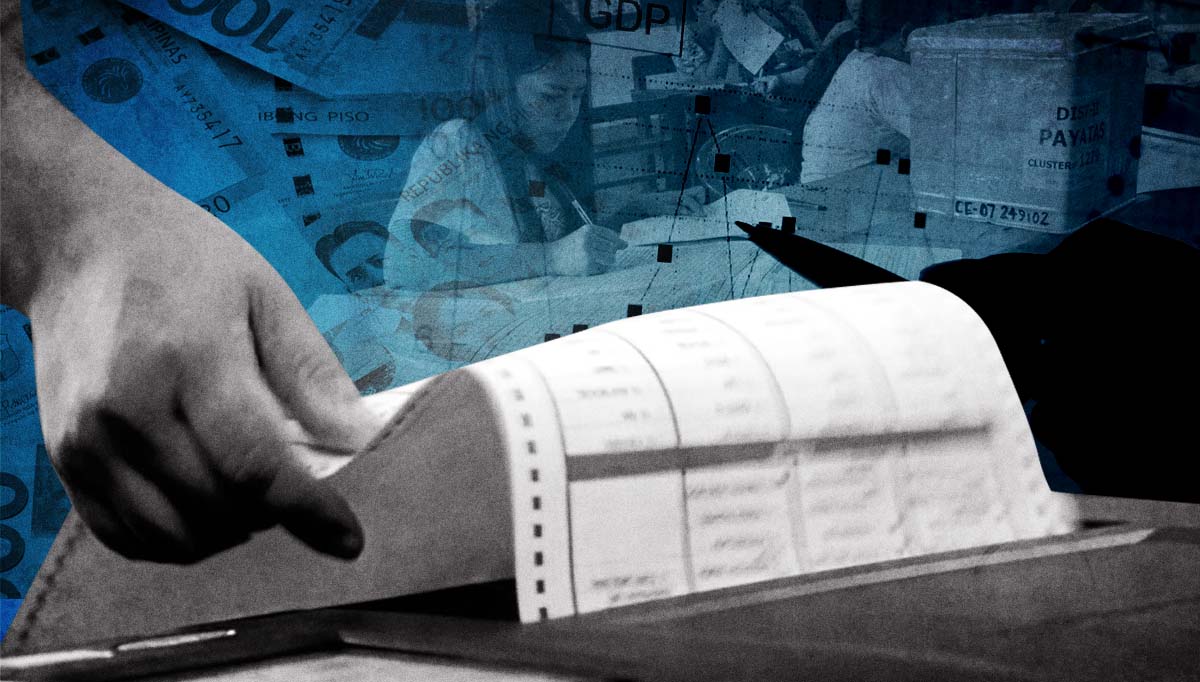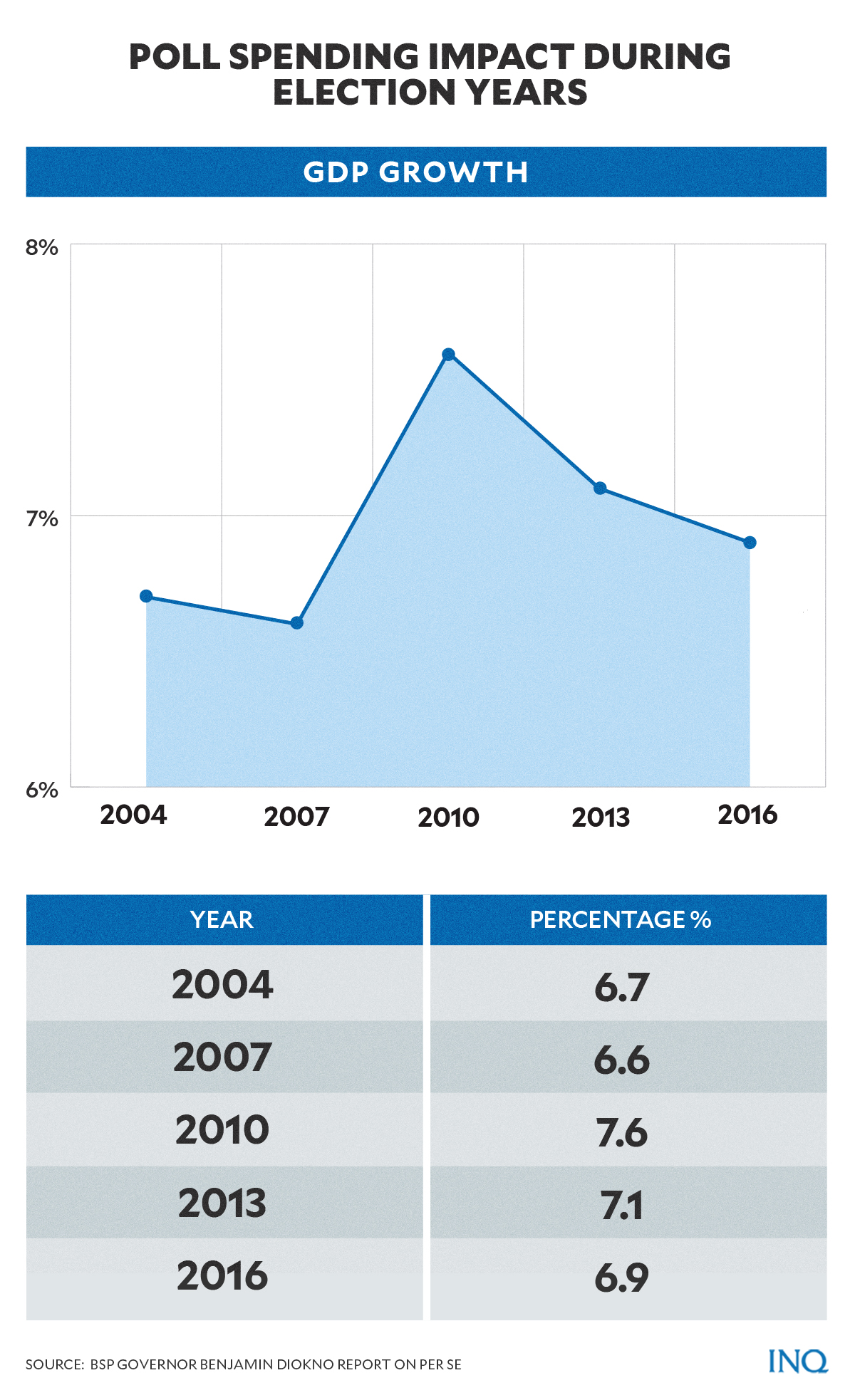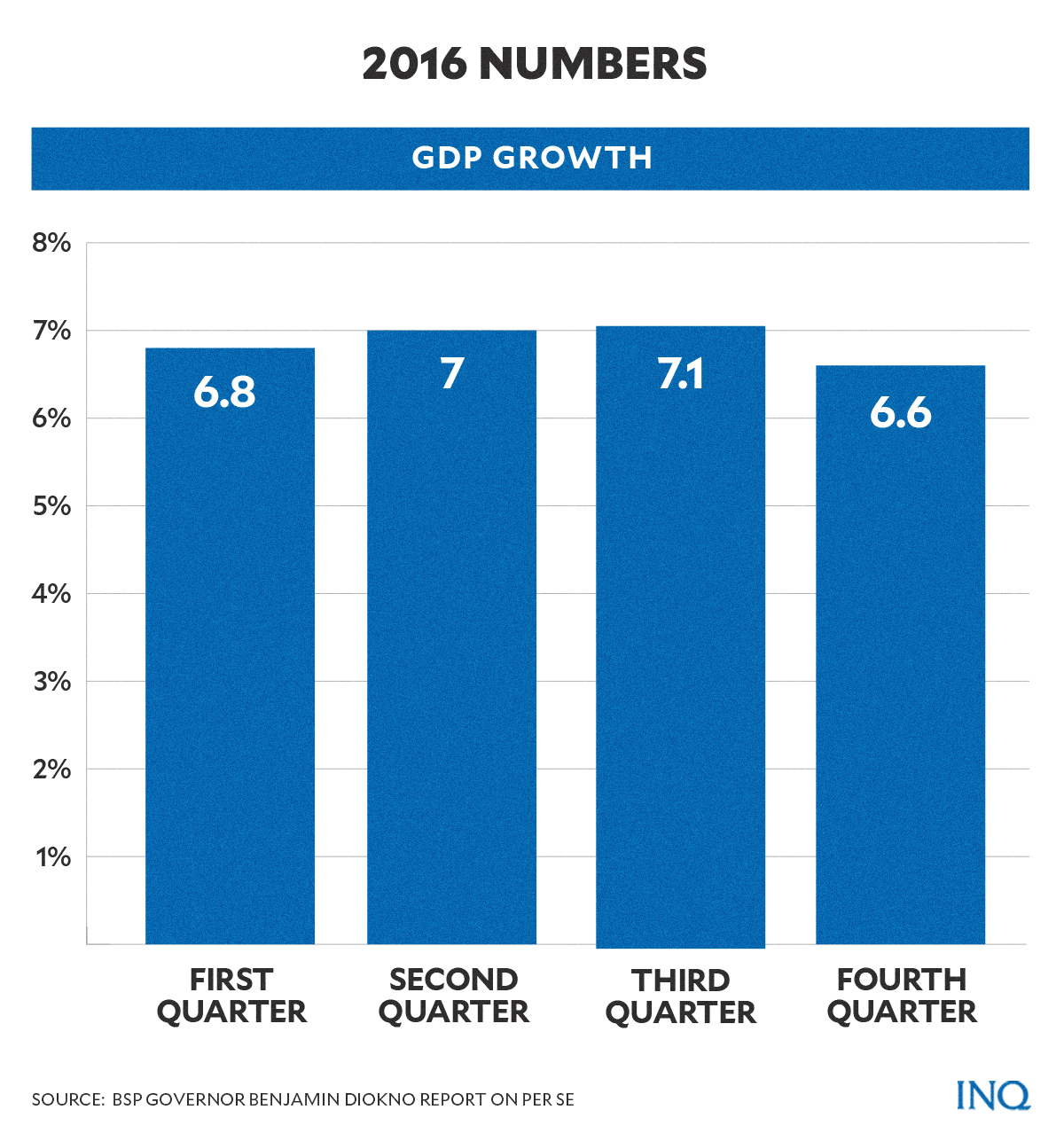2022 election spending: Will it boost PH GDP amid COVID?
MANILA, Philippines—With the national and local elections inching closer this year, can the country’s economic growth—which has taken a beating from the COVID-19 pandemic these past two years—get a boost from this year’s poll spending?
In 2020, the country’s gross domestic product (GDP) shrank by a record 9.6 percent—the worst annual recession in the Philippines’ postwar history—caused by then longest and most stringent lockdowns due to COVID-19.
The economic output slid to P17.9 trillion that year. In 2021, GDP was expected to rise to P19.4 trillion.
READ: PH poised for a strong rebound in 2022, say economists
The government aims for a 7 to 9 percent GDP expansion in 2022, which was much faster than the 4 to 5 percent target last year but at the same rate as economic growth in years before the COVID-19 pandemic.
In this article, INQUIRER.net will try to answer the question of whether the upcoming major elections will help boost the Philippine economy this year—as the country continues to battle against the impact of the dreaded disease.
Article continues after this advertisementElections and PH economy
“[O]ne of the things that we look forward to … is the favorable impact of the national elections,” said De La Salle University school of economics associate dean Mitzie Conchada in a quarterly census survey on Asian economies by think tank Japan Center for Economic Research’s (JCER) released December last year.
Article continues after this advertisementElections, according to former National Economic and Development Authority (NEDA) director-general Cielito Habito, always boost the Philippine economy.
“A quick scan of GDP growth data over the past 25 years would readily show that election years tend to be marked by higher than usual economic growth,” Habito said in a column piece published on INQUIRER.net.
READ: Elections and the economy
Based on data presented by Bangko Sentral ng Pilipinas (BSP) Governor Benjamin E. Diokno in a 2016 column piece on Per SE—which publishes commentary and research on current events and public policy by economists from the University of the Philippines (UP)—there has been a strong economic growth recorded during past presidential election years.
“Every election year, especially in a presidential election year, the economy gets an extra boost,” said Diokno.
Economic peaks which coincided with the presidential and local elections include 6.7 percent in 2004, 6.6 percent in 2007, 7.6 percent in 2010, 7.1 percent in 2013, and 6.9 percent in 2016, still according to Diokno’s report.
In 2016, the same year Rodrigo Duterte ran and won the presidential elections, GDP grew by 6.8 percent in Q1, 7 percent in Q2, 7.1 percent in Q3, and 6.6 percent in Q4.
A report by First Metro Investment Corporation (First Metro) in 2019, ahead of the general elections that year, said the country’s GDP was 7 percent average during the five past election years, while GDP during non-election years was an average of 5.1 percent.
“While there are surely many other determinants of economic growth, the above data seem to suggest that elections have a substantial growth-inducing effect on the economy, pushing growth by up to 2-3 percentage points,” said Habito.
But how exactly does poll spending affect economic growth?
A lot of money flows out during the election season.
Habito explained that whether this money came from hidden or unhidden local or offshore bank accounts, out of government coffers, or other legal or illegal sources, this election money goes around the country’s economy.
“All this money buys campaign posters, streamers and tarps; radio, TV and newspaper ads; land, sea and air transport services for candidates and their entourage; hotel and other accommodations; T-shirts and caps emblazoned with candidates’ names; show business personalities’ talent fees; salaries and wages of various campaign workers; food and meals consumed and given away during the campaign, and so on and so forth,” he added.
A 2010 NEDA paper detailed that at least P13.5 billion additional spending in 2007 can be directly attributed to elections. This was equivalent to a 0.34 percentage point increase in overall GDP, according to Habito.
This figure was comprised of campaign spending by both candidates and political parties, and government spending, specifically by the Commission on Elections (Comelec) on election preparations and the conduct of elections.
The GDP growth, as a result of election spending, however, can be predictably short-lived according to Diokno.
“[T]he economy decelerates right after the election-related boom,” he said.
“[GDP] growth slowed from 6.7% in 2004 to 4.8% in 2005; from 6.6% in 2007 to 4.2% in 2008; from 7.6% in 2010 to 3.7% in 2011; and from 7.2% in 2013 to 6.1% in 2014,” he added.
COVID-19: low boost
While election spending was expected to boost the economy this year, Diokno said it might be at a slower rate compared to previous election years.
“There will still be a bump but not as big as the previous elections,” said Diokno last year at the European-Philippine Business Summit.
He added that the bump brought by the May 2022 elections might be 0.50 percent, half of the usual poll-related contribution to the country’s total GDP growth.
“I don’t think this election would be as expensive as previous elections. I can say that because there will be no open campaigning,” he explained.
“It will be through the social media and as you know, to me, that’s less expensive than the physical campaigning of politicians,” he added.
According to Republic Act No, 7166 which the Comelec implements, candidates or political parties are allowed to spend only P10 per voter if running for president or vice president and P3 per voter if running for other positions.
Candidates without support from any political party, or those running as independent, may spend up to P5 per voter, the law said.
Political parties could spend P5 for every registered voter.
“Any provision of law to the contrary notwithstanding, any contribution in cash or in-kind to any candidate or political party or coalition of parties for campaign purposes, duly reported to the commission, shall not be subject to the payment of any gift tax,” the law said.
READ: The role of money and COVID in the 2022 poll campaigns
Still, some economists were hopeful that the elections can bolster the country’s economic recovery.
READ: PH poised for a strong rebound in 2022, say economists
For this year, economists forecast a 7.1 percent GDP growth, higher than the 6.6 percent in 2021 and within the government’s 7 to 9 percent goal for 2022.
READ: Japan think tank: 2022 poll spending to boost PH economic recovery
Meanwhile, the Cabinet-level Development Budget Coordination Committee (DBCC), in its Fiscal Risks Statement 2022 report released last December, said the upcoming elections “may affect the country’s political and economic climate.”
“The implementation of the government’s infrastructure projects may be disrupted, as public works and the release of public funds during the election period are prohibited under the Omnibus Election Code of the Philippines,” said the DBCC.
READ: Gov’t agencies reminded of election ban on new projects
The DBCC was referring to the ban on public works, which will be implemented 45 days before the general elections.
During this period, the government is prohibited from releasing funds for public works construction and the hiring and movement of government personnel.
The ban aims to prevent government officials from using government resources and facilities to influence voters in their choices.
“The prohibition on public works, as well as for social welfare dole-outs, may contribute to a slowdown on infrastructure disbursements during the first half of 2022,” said the DBCC.
What’s ahead
As the country moves closer to the 2022 general elections, the next administration would not only face the graft and corruption issues that gripped the nation in 2021 and in previous years, but also a gargantuan economic challenge and a mountain of debt, according to Sen. Panfilo Lacson.
“The presidency—I’m saying this without politics, this is just practical application—cannot be practiced because the problems which will be faced by the next administration are already massive. It’s not OJT (on-the-job training),” he said.
“You have to appreciate the problems. Don’t just enter without knowing your problems because you will have a hard time finding solutions,” he added.
READ: Trillions and counting: The mountain of debt next president has to climb
Data from the Department of Finance (DOF) showed that the country has so far borrowed a total of P1.15 trillion for the COVID fight.
The Bureau of the Treasury (BTr) released data that showed that the country’s total debt has reached a historic high of P11.97 trillion as of October 2021.
This was at least 0.46 higher than P11.92 trillion in September. The BTr also said year-on-year debt stock rose by 19.4 percent from over P10 trillion in October 2020.
The DOF reported last month that the national government’s outstanding debt might reach a record-high P13.42 trillion by the end of 2022—which will be faced by the next president and his or her administration.
TSB
RELATED STORY:
Promises: 5 presidential aspirants present plans for PH
For more news about the novel coronavirus click here.
What you need to know about Coronavirus.
For more information on COVID-19, call the DOH Hotline: (02) 86517800 local 1149/1150.
The Inquirer Foundation supports our healthcare frontliners and is still accepting cash donations to be deposited at Banco de Oro (BDO) current account #007960018860 or donate through PayMaya using this link.



